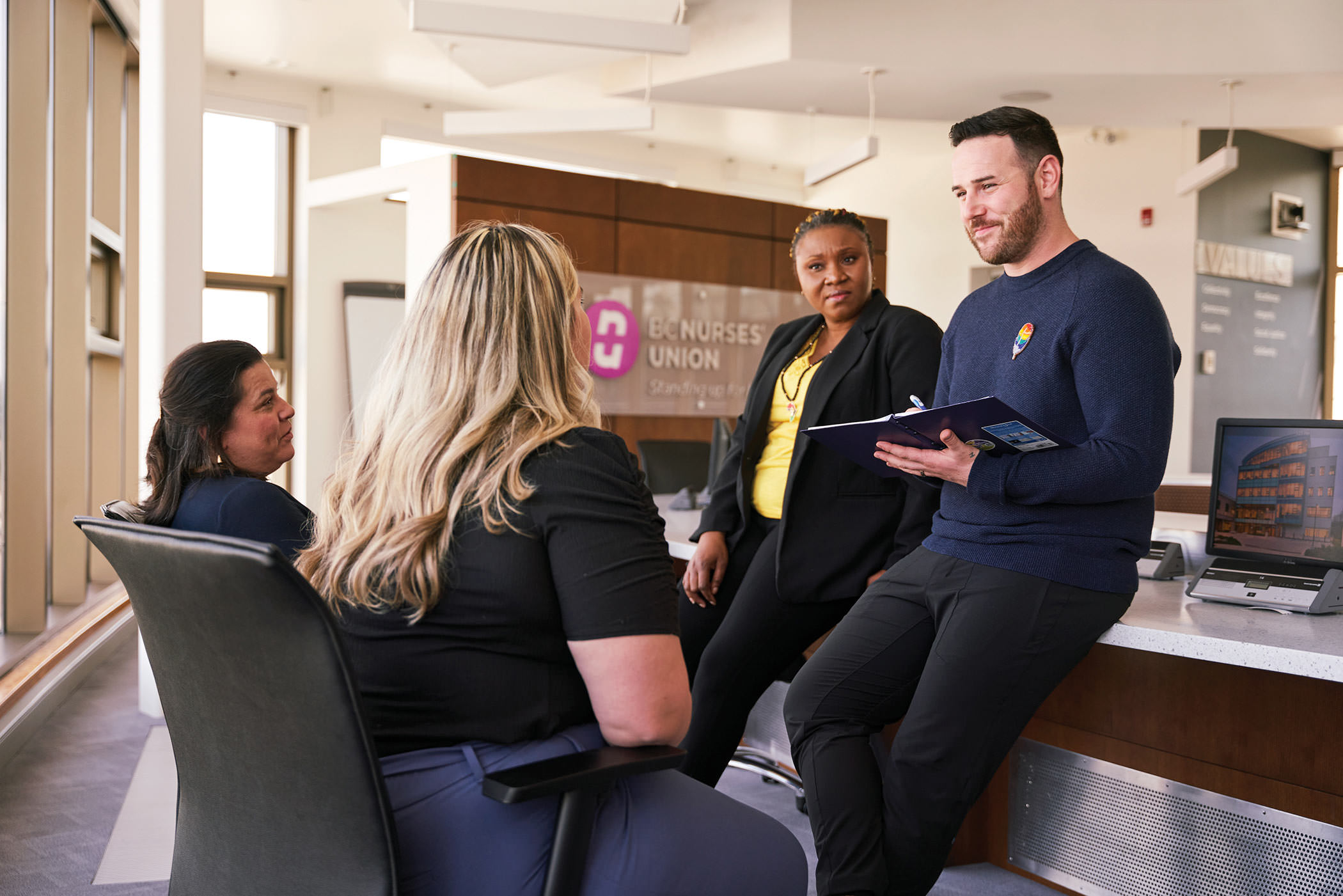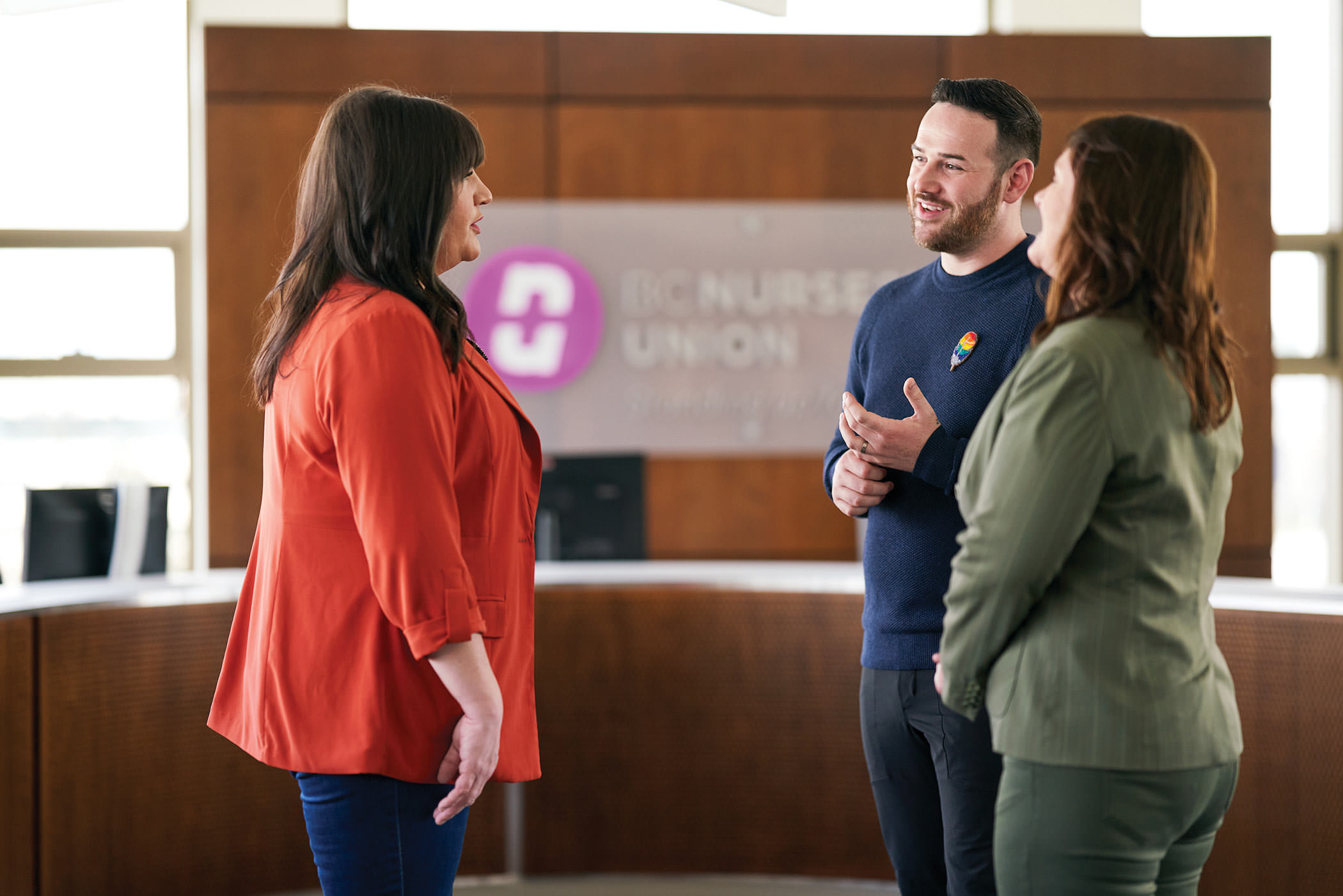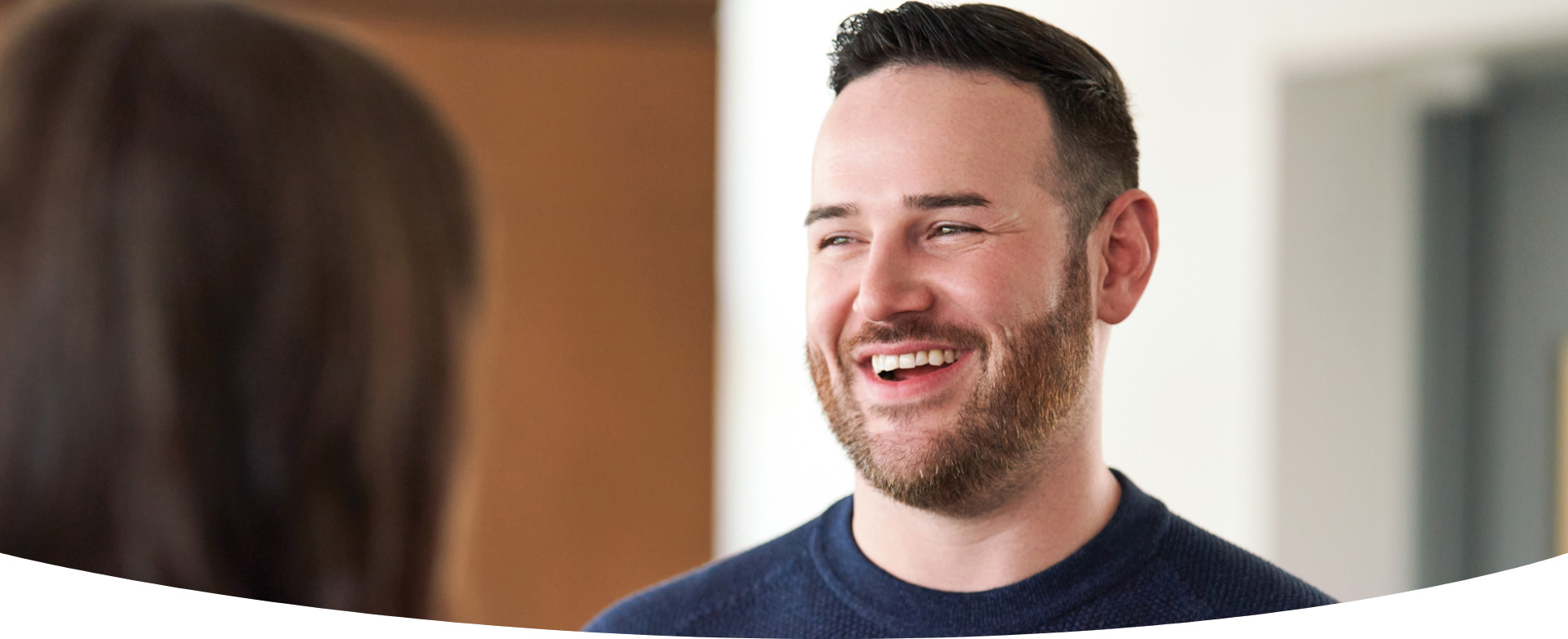JESSY DAME HAS AN UNSTOPPABLE DESIRE TO BREAK DOWN BARRIERS AND FORGE RELATIONSHIPS WITH ALLIES IN THE STRUGGLE FOR SOCIAL JUSTICE.
The queer, Two-Spirit Métis nurse was born in Coast Salish territory, but his family is originally from Treaty 1 and Treaty 2 territory. Dame earned his undergraduate degree from Thompson Rivers University in 2015 and later completed a master of nursing degree from the University of British Columbia.
He began attending BCNU regional meetings during his second year at nursing school and later became a regional rep on the LGBTQ caucus. “I’m very proud to be queer and wanted to express that in my profession,” he says. “I also wanted to advocate for the safety of other queer nurses within the union.”
One of four equity-seeking groups under BCNU’s human rights and equity umbrella, the LGBTQ caucus aims to be a safe and welcoming place for all Two-Spirit, lesbian, gay, bisexual, trans, queer, and gender diverse members as they strive to create a more just and equitable union and workplace – spaces that are culturally safe and free of discrimination.
Dame says the work of the caucus is critical not just for its own members, but for the future of the nursing profession. Nurses within the 2SLGBTQIA+ community regularly encounter personal and professional challenges born out of homophobia, biphobia, or transphobia. Faced with these adverse work environments, they may feel unsupported and vulnerable, leading to increased stress, anxiety, and potentially decreased quality of care for patients.

It also leads to their leaving the profession entirely.
That’s why member solidarity is so important. For Dame, solidarity demands more than joining forces with others who share the same goals and fighting for those goals together. He says it’s also about standing in support of others who need it and amplifying their voices.
“I think all members have a responsibility to stand in solidarity with others who are part of groups like the LGBTQ caucus,” he argues. “We can and should do a lot more within our union for the queer community and our path to equitable working conditions.”
Dame is a member of BCNU’s Richmond Vancouver region and works at a queer sexual health clinic in Vancouver. He was elected provincial chair of the LGBTQ caucus in 2021 and ran for the position to advance the solidarity and allyship he says is so urgently needed.
Dame reports that, as caucus chair, he’s been able to advocate for greater 2SLGBTQIA+ inclusion and representation with all levels of the union. “Our stewards and our leadership are amazing advocates,” he says, “and if we ensure they have the tools that they need to stand with our caucus groups, we can start to address the discrimination that happens at our worksites, in the community and in society overall.”
Dame is grateful the union gave back space for the human rights and equity caucuses during recent Nurses’ Bargaining Association provincial contract negotiations, and says the union’s equity mandate encouraged more 2SLGBTQIA+ members to be part of bargaining and see themselves reflected in the work of the union.
“I’m also very thankful for the other human rights and equity caucus chairs that I’ve made strong relationships with over the last couple of years,” he adds. “We’ve been there to help each other in moments of exhaustion and frustration. This work is our lives, and it’s emotionally draining work.”
Dame stresses that the hard work of advocating for a more just and equitable union and health-care workplace cannot fall solely on marginalized members. He believes it’s important for organizations like BCNU to take proactive measures to prevent this kind of discrimination, and it starts with being an ally.
Through education, advocacy and understanding, unions can foster a culture of allyship, and individual nurses who actively engage in allyship can create more inclusive and welcoming workplaces. Dame says the allyship of both individual union members and the organization as whole is critical for marginalized communities like his.
What does authentic allyship look like? “Allyship is more than just displaying a rainbow sticker or claiming to have queer friends or relatives,” remarks Dame. “It’s actively advocating for the queer community, even when they are not present, and showing up when they need it most, even when it may be difficult.”
The ability to be there to defend marginalized people when needed requires a commitment from allies to forging strong relationships with leaders of the communities they are supporting.
“I believe strong relationships are the foundation of any community and think we all have a responsibility to challenge perspectives that may undermine the strength of our relationships,” says Dame.
As an ally to other marginalized communities, he says he listens to their leaders and supports them in achieving their goals. “And as someone who values the importance of relationships, I make it a point to ensure my work is grounded in the principle of relationality,” he shares.
This principle does not deny difference but rather seeks to more deeply understand how different histories and experiences position people in relation to one another. Relationality does not overlook or render invisible the particular historical, cultural, and social contexts from which individual perspectives arise, but instead puts these considerations at the forefront of engagements across frontiers of difference.

Dame encourages all BCNU members to “engage across difference.” But he reminds individuals of privileged dominant groups about the inequities that persist, even in relationships between allies, and the difficult work of truth-telling that falls on the shoulders of marginalized members.
“It’s essential to recognize the tremendous efforts it takes for someone to speak up and share their experiences of harm inflicted upon their community,” he says. “We must acknowledge the damage caused by the demands placed on marginalized groups to share their trauma in order to be heard and believed.”
Looking to the year ahead, Dame says he is focused on finding ways to make the LGBTQ caucus more accessible to more members while also engaging with those allies that will be needed to support the caucus’s advocacy work. “How can allies show up for the caucus, and how can hetero-centric society take some responsibility and aid in normalizing queer people?” These are questions both immediate and broad he asks members to think about.
Dame says BCNU’s responsibility to provide equitable opportunities for 2SLGBTQIA+ members is a journey that in many ways has just begun.
“We are now starting to see ourselves in our contracts, in union leadership positions and in advocacy work,” he observes. “When I experience queer folks in leadership, I personally strive for more because I can see myself in those positions, for so long, we simply didn’t see queer folks or workers of colour in leadership roles. This is how we will fundamentally change the relationships we have with each other as workers.”
